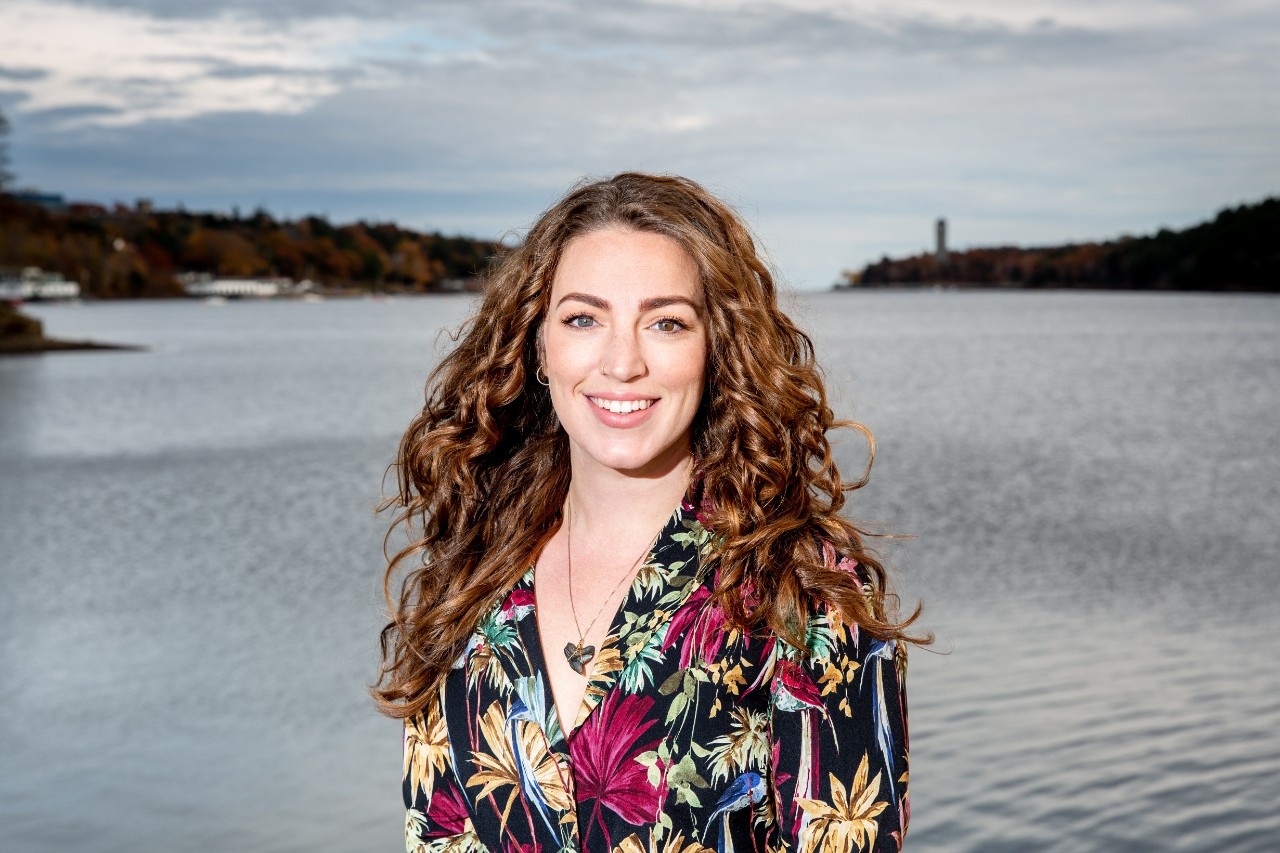Alexa Goodman

A new sustainability leader is on campus. In Fall 2023, Alexa Goodman (BSc 2017: Marine Science & ESS; MMM 2019) began a new chapter as Sustainability Manager at ∫⁄¡œ≥‘πœÕ¯‚Äôs Office of Sustainability. The role involves overseeing programs and initiatives relating to Dal‚Äôs strategic sustainability plans, including projects related to waste management, natural environment, food and procurement, climate action and student engagement, as well as management of casual and part-time staff at the Office.
“My personal mission is turning awareness into action and doing good for this planet and its people, whatever that encompasses,” says Alexa. “In everything that I do, I think you can see those threads of ‘we’re not just talking, we’re doing,’ and that’s what I think we need.”
Growing up in Montreal, Alexa (who uses they/she pronouns) first gained an interest in sustainability through a passion for marine biology. They learned to scuba dive at age 10 and became a certified scuba diver at 12.
“I’m someone who is very much driven by curiosity, but I also absolutely love the marine environment. I grew up by a lake... I always really found so much peace underwater. I was just totally fascinated by marine life.”
Alexa was drawn to Dal‚Äôs Environment, Sustainability & Society (ESS) program as a way to focus their desire for meaningful environmental action, pairing it with a major in marine biology. They enjoyed the experiential learning aspects of the program, citing the negotiation simulations in SUST 2001 (Global Environmental Governance) and a student internship completed with the non-profit Clean Foundation. After taking an ESS independent study course, studying coastal resiliency and sea-level rise with ESS instructor Georgia Klein, Alexa discovered she also had a passion for science communication. ¬Ý
After finishing their bachelor’s degree, Alexa took a summer job as a fisheries observer on haddock trawl boats on Georges Bank (off the coast of Yarmouth) and became interested in the topic of “ghost gear”: lost or purposely discarded fishing gear, such as traps or rope, which accumulate in marine environments and continue to catch marine life. Despite ghost gear being a growing issue, Alexa found very little Canadian research on the environmental impacts.
She decided to tackle the question herself.
In the fall of 2017, Alexa started the Master of Marine Management (MMM) program at Dal and chose ghost gear as their primary research topic, investigating why and how much fishing gear is lost or discarded annually in Canadian marine environments. Their final thesis, , is available online, along with .
“Throughout my undergrad and even in my masters, it really became evident how important the ESS program was, because it enabled a holistic understanding of sustainability, considering the social impacts and the economic impacts,” says Alexa. “The program emphasizes critical thinking and working together, so it’s not just focused on one aspect of sustainability. I really felt like it was the whole package.”
Public interest around ghost gear was gaining traction at the same time as she completed her research, and Alexa’s growing expertise on ghost gear enabled her to take on consulting work after graduating the MMM program in 2019.
In collaboration with the Fishing Gear Coalition of Atlantic Canada, Alexa expanded on her original thesis work and developed a on the state of ghost gear in the Canadian Maritimes. They conducted focus groups with fish harvesters, calculated a trap loss rate, and identified possible areas for future removal. Their report and publications are still cited today by others.
“To get the commercial fisheries to really be on board and to see this as an issue, you have to put a dollar value on it,” says Alexa, reflecting on the power of economic data. “It’s not enough for us to say, ‘Hey, this is catching marine life and creates microplastics.’”
Going on to work with environmental non-profit Coastal Action, Alexa supported trap retrieval efforts and piloted a rope recycling program, providing the impetus for fishing trap recycling initiatives that have since followed.
With a launched in 2023, Alexa continues to offer sustainability consultancy services and event facilitation and moderation. Their clients have included ∫⁄¡œ≥‘πœÕ¯, Fisheries and Oceans Canada, World Wildlife Fund Canada, Perennia, and ECO Canada.
Alongside their consultancy and research work, Alexa has had other personal experience transforming ideas into real-world sustainability action. Inspired by an environmental education course in their MMM program, Alexa launched a campaign called Stop Trashing It, challenging members of the public to commit to giving up one type of single-use plastic for a whole year.
Stop Trashing It became a formal non-profit and soon expanded its mission to more broadly support “living lighter on the planet,” growing to involve a board of directors, paid staff, student internships and co-op students, and blog contributors from across Canada who submitted content.
Due to health challenges in 2019, Alexa had to put the project on hold, but their experience with the non-profit was a rewarding one. “It is very much something I hold dear in my heart.”
Going forward, Alexa hopes to bring her skills and passion for supporting meaningful change into her job as Dal’s Sustainability Manager.
“We have so many great researchers here at Dal, so many great minds, we just need to translate that into action. So I really hope to bring that lens into my role with the Office of Sustainability,” says Alexa, adding that she welcomes visits and questions from campus community members.
“I’m more than happy to talk to students if they have ideas or want to talk about career growth. I am pretty good at making myself available for folks!”
December 2023
